
Guests
- Sam Husseinicontributing writer to The Nation and senior analyst with the Institute for Public Accuracy.
Before Monday’s highly anticipated joint press conference with President Trump and Russian President Vladimir Putin, one of the reporters was forcibly removed from the room. Sam Husseini was credentialed to cover the summit for The Nation magazine, and earlier in the day he tweeted, “The issue isn’t Trump. The issue isn’t Putin. The issue is the issues: Nuclear threats, Syria, etc.” Before Trump and Putin spoke at the press conference, video shows Husseini holding a piece of paper that reads “Nuclear Weapon Ban Treaty.” A security official aggressively tries to take the sign from him. We speak with Husseini about his arrest and the questions he was trying to raise. “It wasn’t a protest,” he says. “It was just an attempt to do serious, aggressive journalism, which I think is what we need.”
Transcript
JUAN GONZÁLEZ: President Trump is back in the United States and set to meet with lawmakers today, after his joint summit with Russian President Vladimir Putin in Helsinki. During a joint press conference Monday, Trump stood next to Putin as he lashed out at his own intelligence agencies over the investigation of alleged Russian interference in the 2016 election.
PRESIDENT DONALD TRUMP: I think that the probe is a disaster for our country. I think it’s kept us apart. It’s kept us separated. There was no collusion, at all. Everybody knows it. People are being brought out to the fore, so far that I know, virtually none of it related to the campaign. And they’re going to have to try really hard to find somebody that did relate to the campaign. That was a clean campaign. I beat Hillary Clinton easily. And, frankly, we beat her. And I’m not even saying from the standpoint—we won that race. And it’s a shame that there can even be a little bit of a cloud over it. People know that. People understand it. But the main thing—and we discussed this also—is zero collusion. And it has had a negative impact upon the relationship of the two largest nuclear powers in the world. We have 90 percent of nuclear power between the two countries. It’s ridiculous.
JUAN GONZÁLEZ: President Trump’s remarks drew bipartisan outrage, with Senate Armed Services Committee Chair John McCain calling them, quote, “one of the most disgraceful performances by an American president in memory,” and former CIA Director John Brennan tweeting that they exceeded, quote, “the threshold of 'high crimes & misdemeanors.' It was nothing short of treasonous.” Trump’s own director of national intelligence, Dan Coats, said in a statement, that was reportedly not cleared by the White House, quote, “We have been clear in our assessments of Russian meddling in the 2016 election and their ongoing, pervasive efforts to undermine our democracy, and we will continue to provide unvarnished and objective intelligence in support of our national security.” Even Fox News joined in the chorus of criticism, with Neil Cavuto of Fox Business calling Trump’s comments, quote, “disgusting,” and Fox News anchor Bret Baier calling it “surreal.”
AMY GOODMAN: President Trump later defended his remarks, tweeting, “'I have GREAT confidence in MY intelligence people.' However, I [also] recognize that in order to build a brighter future, we cannot exclusively focus on the past — as the world’s two largest nuclear powers, we must get along!”
Meanwhile, Putin acknowledged he had wanted Trump to win the 2016 election, but reiterated his denial of meddling.
PRESIDENT VLADIMIR PUTIN: [translated] It is obvious to everyone that our bilateral relations are going through a difficult period. But these difficulties and tense atmosphere have no objective grounds. The Cold War is long over.
AMY GOODMAN: Before Monday’s news conference began, one of the reporters in the room was forcibly removed. Sam Husseini was credentialed to cover the summit for The Nation magazine. Earlier in the day, he tweeted, “The issue isn’t Trump. The issue isn’t Putin. The issue is the issues: Nuclear threats, Syria, etc.” Before Trump and Putin spoke at the news conference, video shows Husseini holding a piece of paper that read “Nuclear Weapon Ban Treaty.” A security official aggressively tries to take the sign from him. Sam Husseini can be heard saying he’s looking for his glasses, which were knocked off his face, before guards dragged him out. Listen carefully.
SAM HUSSEINI: I don’t [inaudible]—excuse me! [inaudible] did you knock my glasses down? You’re going to step on my glasses! Why are you—why are you—I’m being open! Oh, my god! What the? You’re grabbing me, for what? I’m telling you what I’m doing! I’m being totally open! What the hell?
AMY GOODMAN: For more on this and the outcome of the U.S.-Russia summit, we’re going directly to Helsinki to speak with Sam Husseini. He’s just outside the palace, where he was removed on Monday. Again, contributing writer to The Nation magazine, senior analyst with the Institute for Public Accuracy.
Sam, it’s great to have you here. Unfortunately, you did not witness the news conference or get to ask a question, because you were dragged out, as we watched you on television, as people did all over the world, just before the news conference began. Can you tell us what happened?
SAM HUSSEINI: I had the sign, not, as many people have reported, as a protest at all. I had the sign as an attempt to grab the attention of one of—of either Trump or Putin, to get them to ask me—to get them to allow me to ask a question about nuclear policy.
They postured themselves in the news conference, which I was able later to hear—I wasn’t able to hear it when I was being detained—as, you know, stalwarts of statesmen, that they want to stop nuclear proliferation. The headline here should be: As these guys are threatening the planet with their nuclear weapons, most of the planet, through the weapons ban treaty, wants to get rid of the nuclear weapons, and they’re refusing to do so. Instead, we’re focusing on what are, I would have to argue, tangential, minor issues.
They wanted—some journalist told them that I had this piece of paper. I was escorted out of the room, given assurance that I would be let back in. And then they—when I showed them the paper, I expected them to say, “Oh, OK, you’re not a protester. You know, it’s fine,” or, “We don’t want you to do that. We don’t want you to hold up a paper. Please don’t do that, or please give us the paper.” Instead, journalists were asking me what was going on, and I was trying to openly say I was going to hold up this paper to try to get a question in. And they lunged at me for the paper, shoved me out of the room, held me in detention, I believe, until the news event was over, and, you know, wouldn’t let me speak to anybody in authority, wouldn’t let me have access to my phone or anything like that, wouldn’t give me anybody’s names.
After the conference was over, I went—they took me outside, and there were some people outside, and I said, “This is press freedom in Finland.” There are signs all over town here about how Finland is for press freedom and is in opposition to Trump and Putin’s authoritarianism. So I felt it rather ironic that Finnish officials were dragging a journalist out of a news conference, that Finnish officials were manhandling me in many ways. And when I shouted that, they shoved me to the ground, handcuffed me behind and on my legs, and threw me in the back of a police vehicle, took me to a detention facility north of the city and help me there until midnight, which is when the media centers closed. I don’t think that’s a coincidence. It’s—
JUAN GONZÁLEZ: Sam, I wanted to ask you—you’ve been—
SAM HUSSEINI: —somewhat speculative on my part.
JUAN GONZÁLEZ: You’ve been covering White House press conferences for decades. And you’re saying that some reporters notified security that you were holding up a—that you had a sign in your hands? Could you—was it American reporters who did this, or what?
SAM HUSSEINI: I don’t know who it was. But when—you know, the officials came to me and said, “Can we speak to you?” And I didn’t know what it was about. And, you know, I got assurances from them that I would be let back into the room. And even then—and a lot of people were asking, you know, “Why is this person being singled out?” And I said, “I’m Sam Husseini. I’m with The Nation magazine,” in case I wasn’t let back into the room. I went through a room where the dignitaries were, so-called dignitaries. And they questioned me, and they told me that “Somebody told us”—they implied it was a journalist—”that you had this piece of paper.”
And so I said, “Oh, that,” because I didn’t know what the problem was. “Well, it’s true. Here, let me show you what the piece of paper is, and let me explain.” So I went back in the room. An NBC reporter, you know, said, “So what’s going on?” So I was attempting to explain. I held up the piece of paper. People were still waiting for Trump and Putin to come into the room. We’d been waiting for hours, taken on and off the bus. It was a very chaotic situation generally.
And then they—you know, as I was in the midst of starting to explain what was going on or what I had planned, that it wasn’t a protest, it was just an attempt to do serious, aggressive journalism, and which I think is what we need. The more substantial the journalism, the more focused it is, I think the more peaceful the outside world would be. That was my motivation here.
They lunged at me, dragged me to the floor—I was trying to get my glasses—dragged me out of the room and then continued to manhandle me on and off, whenever they would make demands. They wanted to take a picture of my passport. I said, “OK, you know, I’ll let you take a picture of my passport if you let me at least listen to the news conference that you dragged me out of.” And they were like, “No!” and, you know, were forcibly trying to take my passport.
AMY GOODMAN: Sam, can you explain what the Nuclear Weapons Ban Treaty is that you were—that you were holding in your hand? I have to say, in watching CNN, Christiane Amanpour, after, as they were saying it looks like a protester, etc., she said, “It actually may just be a reporter who wants to ask a question.”
SAM HUSSEINI: What a novel thought that would be.
Sure. One year ago, 122 countries passed at the U.N., voted for, a nuclear ban treaty. This is an attempt to remedy a huge structural problem. It came in—this month is 50 years since the Nuclear Nonproliferation Treaty, which was supposed to strike a deal. The nuclear powers—the U.S., Russia and the others—would agree that they would move towards elimination, good-faith efforts at elimination, of their nuclear weapons, in return for the other countries not acquiring nuclear weapons. The U.S. has totally reneged on that. So, after this has become evident, some countries moved to this nuclear ban treaty. The group behind it, ICAN, won the Nobel Peace Prize last year. This has gotten ridiculously little coverage, ridiculously little understanding, in the U.S. and elsewhere.
And that was what I was highlighting, that these men, who would go on in the news conference to talk about proliferation and about how responsible they are—proliferation/nonproliferation is an Orwellianism, in a sense, because what it’s saying is we get to have our nukes, and nobody else does. We maintain the monopoly of violence in the world. We will threaten the world for our geostrategic interests. That’s fundamentally what’s going on here. They can scream at each other, the U.S. establishment and the Russian establishment, just as the Democratic establishment and Republican establishment scream at each other, and, meanwhile, the wars that they both want continue, the economic exploitation that they want continue. So, levels of volume of alleged screaming, when you’re talking about Democratic Pharisees and Republican Sadducees, doesn’t indicate actual animosity, in my view. It’s a way of drowning out some people who might be attempting to divine a measure of truth and freedom in our current circumstances.
AMY GOODMAN: Sam Husseini, speaking to us from Helsinki, contributing writer to The Nation magazine, senior analyst with the Institute for Public Accuracy. I want to thank him for being with us, dragged out yesterday, just before the news conference after the summit between President Trump and President Putin.

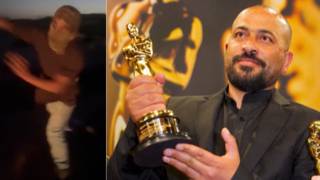
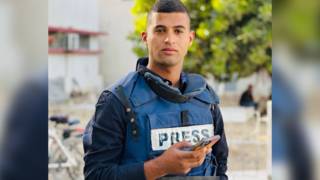
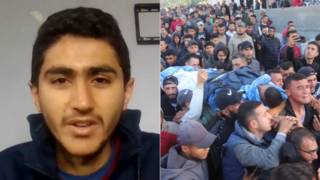
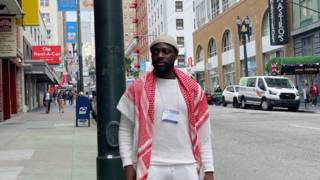





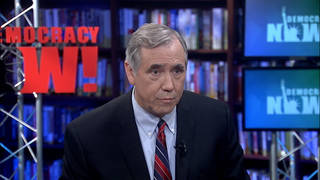
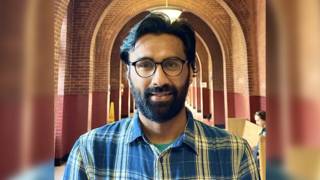
Media Options